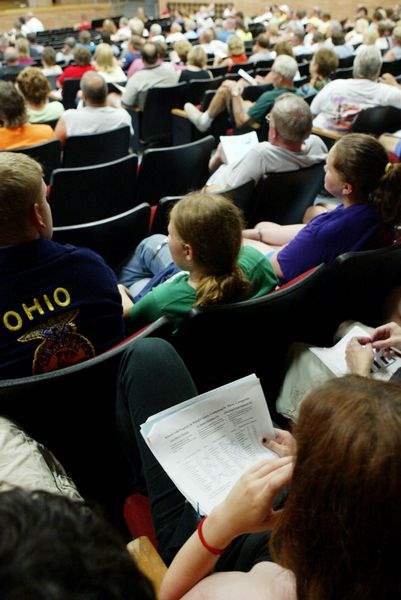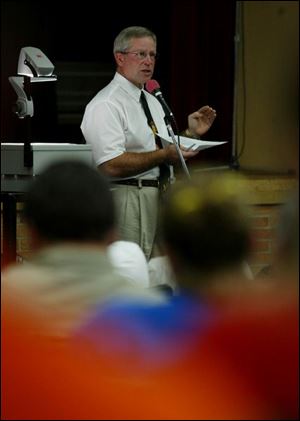
District spells out its financial woes to voters
7/19/2005
Members of the community hear district officials tell them that a five-year, 4.8-mill funding request is needed to stave off a looming $2.4 million deficit in fiscal year 2007. McFarland
The Blade/Alyssa Schukar
Buy This Image

Members of the community hear district officials tell them that a five-year, 4.8-mill funding request is needed to stave off a looming $2.4 million deficit in fiscal year 2007. McFarland
PEMBERVILLE, Ohio - To ensure that voters in the Eastwood Local School District are informed as to why a levy needs to be approved next month, the school board held a public forum last night to provide information on the district's financial situation.
Superintendent Bill McFarland and Treasurer Dave Michel opened the forum by explaining that the district is losing state funding because of decreased enrollment, and it is projecting a deficit of $2.4 million for fiscal year 2007 if a funding request is not approved before then.
"With tax issues, you cannot wait until you're in a deficit," Mr. McFarland told the audience of about 200. "You have to work toward the future. The longer you wait, the worse your condition will be."
The district is asking voters to approve a five-year, 4.8-mill emergency operating levy on Aug. 2 that will raise $878,000 a year. If approved, it would cost the owner of a $100,000 home an extra $168 a year.

McFarland
If the levy is not approved, Mr. McFarland said a number of positions and contracted services totaling more than $330,000 could be reduced or eliminated, including field trips, the after-school intervention program, full-time substitute teachers, food service supplemental positions, overtime, professional leave for staff, and half the extended time that had been approved in the past.
He said the board has made nearly $250,000 in reductions to save money, including reducing janitor hours, summer part-time workers, and building spending. They have also eliminated two elementary school teaching positions, summer school, the summer school intervention program, and the summer physical education program.
Many of the reductions are be-cause of the cuts in state funding and decreased enrollment, Mr. McFarland said, adding that the number of students attending Eastwood schools dropped from 1,981 students in the 2003-04 school year to 1,902 students last year. The district has projected it will lose another 20 students next year.
Mr. Michel added that along with state funding, the district operates on local taxes. "They're basically the crux of what we get as far as money to run the school," he said.
After about 45 minutes laying out the district's situation, the board opened the forum to the audience, many of whom commented that the it was a good way to get their questions clarified.
While a few commented on why they did or did not vote to approve levies in the past, most asked questions that ranged from why the board was asking for a levy in August to how the board selects which programs to put on the chopping block.
The superintendent said the district is asking for a levy now because they have three chances in a calendar year to pass a funding request, and an identical levy failed in May. If a levy is not passed next month, he said the board would look at going on the ballot again in November.
Eastwood High School sophomore Jesse Abraham, 15, said he was concerned that cuts would affect the school band, where he plays drums.
"It's the only thing I'm in and it's important to me," he said.
Board President Denis Helm said it's difficult to eliminate programs. "We try to pick what will impact the students the least amount and still maintain the most viable and most accessible education that we can," he said. "But if a levy passes in August, guess what? We won't have to do any of it."